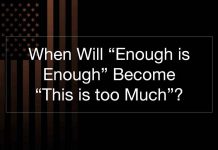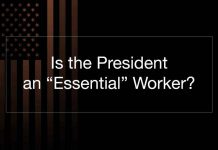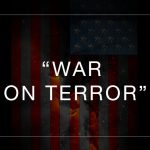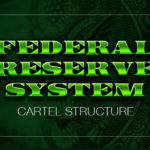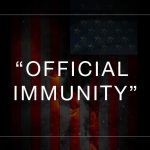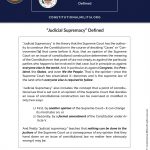Last Updated on March 21, 2022 by Constitutional Militia
Although at the present time I am one of very few people, if not the only person, vociferously advocating revitalization of “the Militia of the several States” along strict constitutional lines, I am confident that the Forces of Darkness fully anticipate that I shall not remain for much longer a lonely “voice crying in the wilderness” of the Internet and the market for rare books. Rather, as this country lurches ever-closer to crisis because of their insatiable avarice, ambition, and appetite for power, accelerated by their inexhaustible arrogance, the Forces of Darkness realize that time is running out and that truth will out. The consequences of that eventuality being so detrimental to them, they need to take counteraction soon, before they find themselves pitched out on their ears.
They have four options:
-
- Silence—to keep as many people as possible in the dark about revitalization of the Militia for as long as possible. If that does not work,
- Misdirection—to lead the initially small number of self-educated idealists and activists into self- destructive behavior. If that does not work,
- Defamation—to smother the movement in derision and demonization, so as to poison the minds of the general public, and thereby stunt the movement’s growth. And only if all these do not work,
- Suppression—to employ brutal police-state methods to smash the movement (although such a course of action may prove problematic, possibly self-defeating, once the Militia have been revitalized in even a few States).
With the Internet in so many homes, silence is no longer a viable tactic. The idea already courses through the ether, easily accessible to all and not subject to erasure. Moreover, left to its own devices, it can only gain adherents and practitioners, because revitalization of “the Militia of the several States” offers the best alternative available to return this country to constitutional self-government by We the People in the near future.
Defamation is not at the present time a viable tactic, either. Inasmuch as derision and demonization contradict the tactic of silence, they can be employed only when silence no longer suffices: that is, only when an idea already threatens to explode into a powerful political movement. For revitalization of the Militia, however, that time has not quite arrived. So the Forces of Darkness need not yet mobilize their morally club-footed Goebbels-figures in the media and among the intelligentsia—although this country can expect to hear from these ranters soon enough, as more and more common Americans wake up, listen up, and start to speak and act up, and the enemies of popular self-government try to shut them up with name-calling, bluster, and threats.
So, right now, Americans should expect the Forces of Darkness to favor misdirection in order to divert idealists and activists from the true Militia to various false “militias”. Misdirection can be adventitious, when the Forces of Darkness rely on common people who are acting in good faith, albeit mistakenly. Or it can be artificial, when the Forces of Darkness deploy their own malicious agents provocateurs and other operatives to conduct people down blind alleys.
1. In the first category are found most of those Americans around the country who already participate in, or contemplate joining, various private “militias.” By in large, their motivations are patriotic and to that extent laudable. Nonetheless, because few of them are legal historians, their research tends to be less than sufficient, their plans less than adequate, for the difficult task they have set themselves to perform.
Although some of these private “militias” claim “common law” as their basis, they cannot stand on such a foundation. For “common law” had nothing whatsoever to do with the formation and operation of the Militia in any of the Colonies or independent States prior to ratification of the Constitution. All of those Militia were the products of charters or statutes. And in none of them did judges or sheriffs play any directing role. Under the Constitution, therefore, the same pattern must obtain today.
As wholly private organizations with no legal authority peculiar to themselves—for certainly not a single one of them has been empowered by a State statute to participate in the activities they have taken upon themselves—these “militias” are necessarily not parts of the government of any State or Locality. Indeed, they view themselves as at least potential antagonists and opponents of “the government” in general—which they condemn (and not inaccurately) for serial oppressions already inflicted upon common Americans; which they suspect (and not unfairly) is plotting to commit even more of these offenses; and which they intend and are preparing to resist. Their resistance, however, they proclaim will be entirely defensive—an assertion supported by their behavior. For their members arm for and train in the small-unit tactics practiced by guerrilleros, steeling themselves for the day when “the government” causes some crisis so devastating that large numbers of Americans are compelled to rise up in open, armed rebellion, to preserve their lives, liberties, and property from wanton destruction.
That such a crisis is possible, perhaps rather probable, is anything but a paranoidal delusion that haunts these private “militias” alone. For example:
-
- Some 9/11-type “terrorist strike,” whether real or engineered, might be used to rationalize a nationwide police-state lockdown under “emergency powers” and “martial law.”
- As part of or in preparation for such a lockdown, a nationwide seizure of privately owned firearms might be attempted.
- A gun grab might set the stage or provide the excuse for a nationwide round-up of dissidents for incarceration in concentration camps.
- A monetary and banking collapse might usher in, or result from, a nationwide police-state crackdown. And,
- Even an apparently benign “merger” that melds Canada, the United States, and Mexico into a North American Union could serve as a reason for confiscation of Americans’ privately owned firearms—because the “gun-control” laws in Canada and Mexico could not coexist with the rights Americans now enjoy under the Second Amendment; with “open borders” the traffic into and out of the United States would defeat those Canadian and Mexican laws; and, therefore, the Second Amendment would have to be set aside perforce of the North American Union’s supposed “supremacy” in hemispheric legislation.
In any event, when the day of reckoning finally dawns, for whatever reason, these various private “militias” expect to fight “the government” somewhere —in the forests, swamps, and hills—in the sewers and utility-tunnels of the big cities—in the residential rabbit warrens of suburbia—until the majority of the population finally comes to its senses and joins them. Or at least the “militias” will survive as guerrilleros, managing to elude extermination or capture.
Such private “militias” exist, and will continue to exist, because they embody the romantic legends that surround Robin Hood, Francis Marion, John Singleton Mosby, Michael Collins, the French Resistance, and the Hungarian freedom fighters. Unfortunately, in any major crisis in the near future they will fail of their purpose, because they will lack sufficient members, supporters, and sympathizers. This, for at least three reasons:
First, these private “militias” enjoy no credible claim to any actual legal authority as “militias.” And, absent color of authority, they cannot convince more than a small minority of Americans to participate actively in their operations, or the majority of their countrymen to support them even passively.
Second, these private “militias” tend to recruit their members almost exclusively from one social group: the so-called “gun culture.” For this reason, all too many Americans dismiss them as being composed of “extremists,” if not worse. Such misconceived disdain is the practical kiss of death for their strategy, because in the classical formulation guerrilleros are the fish, the rest of the people the sea—and without the sea in which to move, to find nourishment, and to hide from predators, the fish will die.
Third, and worst of all, these private “militias” predicate the necessity for their existence on the conclusion that the American people have already lost the major legal and political battle for liberty. For them, “the Constitution is dead”—“the government” is separate from, independent of, antagonistic to, and irretrievably the enemy of We the People—and tyranny cannot be deterred, forestalled, or defeated throughout this country, only feebly resisted here and there.
To characterize this argument as merely erroneous credits it too much. It is pernicious. For the Constitution is absolutely essential to prove what We the People’s powers are, and (even more to the point) what the powers of rogue public officials are not—in particular, that these usurpers and tyrants enjoy no more authority, and should expect no more obedience, than a bag-woman on the streets of New York City. After all, without the Constitution, what legal basis for self-government by We the People must public officials respect? If the honest ones want to claim their offices under the Constitution (as all of them do, at least in form), they must also admit the Constitution’s limitations on the powers of those offices. They cannot assert their constitutional powers without abiding by their constitutional
disabilities. Therefore, they must concede We the People’s supreme authority under the Constitution, too. And as for dishonest, rogue public officials, the Constitution provides We the People with the most efficacious means to suppress their misbehavior, if Americans have the wit, the wisdom, and the will to use it—the very first step in the process being to affirm that those means are very much alive, not “dead.” For part two click below.





























